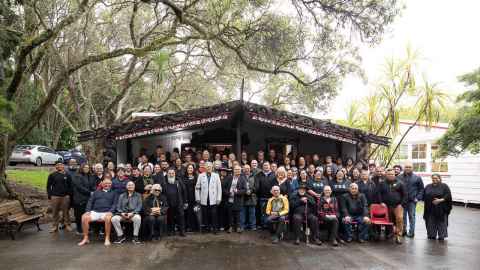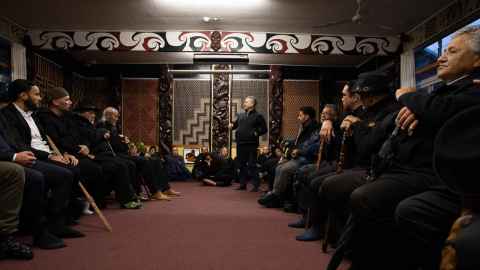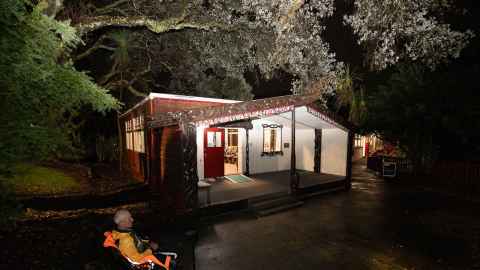Tūtahi Tonu, the University's first established marae has begun dismantling as the Faculty of Education and Social Work starts a new chapter at the City Campus.

On 18 November, former and current kaimahi and tauira across Waipapa Taumata Rau, University of Auckland, farewelled Te Aka Matua ki Te Pou Hawaiki, the Epsom Campus Marae. But the mana and mauri of Tūtahi Tonu wharenui will become part of the City Campus.
The farewell follows the closure of Epsom Campus which has been home to teacher education for 100 years, in the form of Auckland Teachers College, Auckland College of Education and finally the Faculty of Education and Social Work. The faculty has moved to the University's City Campus for a new era.
But it is bringing an important part of its history with it. The 40-year-old wharenui is being dismantled, and its taonga, including carvings, kōwhaiwhai and tukutuku, will be restored and rehomed.
Tūtahi Tonu is a part of Te Aka Matua ki Te Pou Hawaiki, which was the second marae to ever be established in a tertiary setting in Aotearoa New Zealand, and the first for Waipapa Taumata Rau. In November 2023, it underwent a rare whakamoe ceremony which put the whare into a deep slumber on its 40th birthday.
This whakamoe is in place to symbolise the mana and mauri of Tūtahi Tonu which is resting until its move to the University's City Campus is complete.
The carvings from inside the marae will be restored in preparation for their new space on the City Campus. The aim is for the new marae to open around Matariki 2024. Tohunga whakairo (master carver) Arekatera Maihi of Ngāti Whātua Ōrākei and Ngāpuhi descent, is overseeing the process, assessing the carvings before their installation.
The new Tūtahi Tonu space will function as a marae, alongside the University's Waipapa Marae which opened in 1988. Tutahi Tonu's carvings were originally created by Mark Klaricich.

Meant to be
Many staff are sharing memories of Tūtahi Tonu. It all started with "the whare that fell off the back of the truck," says director of Māori medium education Hēmi Dale.
The physical wharenui had arrived on the back of a truck and was set to be used as a classroom for the School of Music. However, the truck came to a halt and the driver asked Tarutaru Rankin, a pioneer in Māori education, for directions.
"The driver was lost and didn't know where to put the prefab so when he spotted Taru, he stopped the truck and asked him," Dale says. "It was in that moment that Taru immediately saw a window of opportunity to establish a marae ātea (space).
"Taru said to the driver, 'you're in the right place!' and he quickly rang Hare Tāwhai to come and bless the area so that it could become a marae ātea."
Kaiwhakaruruhau Pāngarau Bruce Taplin was a kaiwero at the initial opening in 1983 when he was a student and has been an integral part of the marae's growth over the past 40 years.
"Taru had a vision of what Tūtahi Tonu would be, with a main goal to commit to enhancing Māori education," Taplin says. "The music school didn't speak to him for a while - but it was worth it."

Haven for Māori and Pacific education to thrive
Says Taplin: "Being born in the city, although I know where I'm from and I know my marae, I don't have the daily attachment to it, so I've been able to make my connection to my Māoritanga through Tūtahi Tonu. Many of us who have passed through here have."
"Many of the tauira Māori experiences were similar to mine so it became a marae for us all. We hold it very closely; we consider it our marae although it's part of the University."
It was also a haven for Pacific students to thrive as former teacher trainees shared at the 40th celebration. Among them was Nerina Howe (of Sāmoan descent) who spoke of being from Ōtara and finding a home with Tūtahi Tonu. In an earlier interview with the University of Auckland, Howe said te ao Māori strengthened her identity as a teacher and as a Polynesian.
"Being in the Māori Studies Department and on the marae was the first time I got a real sense that my identity was worth far more than the physical aspect of it. I learned that I did not have to be ashamed of being a Polynesian. I didn't have to pretend to be a Palagi imprisoned in a brown-skinned outfit, as unpopular or popular as that would have been."
Howe's reflections sit within the social and historical context of the 1970s when the population of Pacific peoples rapidly increased in Tāmaki Makaurau. Schools scrambled to adjust to the expanding cohorts of Pacific students in previously mostly monocultural classrooms dominated by Pākehā values.
Within the whare stood several pou which represent the relationships with Māori, the Pacific, tauiwi and Pākehā, encompassing cultures of all backgrounds and welcoming all who entered it. Inside there were also tapa cloths and various taonga from across the Moana nui a Kiwa, and these will be moved to the new location.
Tūtahi Tonu has been the central hub for puna reo in central Auckland, Kura Kaupapa Māori, and children at Te Puna Kōhungahunga, and once housed Te Wānanga Takiura. It will continue to operate as an incubator for Huarahi Māori, the University's full immersion te reo Māori teaching degree.
Tūtahi Tonu means to stand united and tall together. Kaikōrero (speakers) at the farewell pōwhiri said although the whare would be no longer, the kaupapa and its people would stand together forever.
New beginnings
Hēmi Dale says, "The wharenui is a physical representation of the students' dreams and aspirations to become speakers of te reo Māori, to know about tikanga Māori and to engage in mātauranga Māori."
While Dale admits to feeling some sadness in saying goodbye to the marae and its location, he looks forward to the new phase and working alongside Waipapa Marae.
"I have mixed feelings in terms of moving, in the sense that there's been a long history of teacher education here. The whare has sat here since 1982, the photos of the wall represent the pioneers of this place who brought Tūtahi Tonu to life," he says.
Official welcome to City Campus
On 9 February 2024, the Faculty of Education and Social Work will mark their official start at the City Campus, with a mihi whakatau led by Te Tari o te Ihonuku Māori (Pro Vice-Chancellor Māori office).
The welcome acknowledges the history of the Faculty at the Epsom Campus and the knowledge and expertise that kaimahi and tauira will bring to the City Campus.






